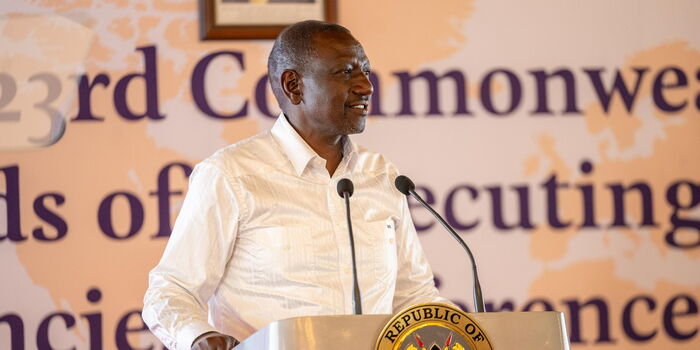President William Ruto has responded to the recent decision by the European Commission to list Kenya among countries with weak money laundering and terrorism financing controls.
Speaking in Mombasa on Thursday during the closing ceremony of the Commonwealth Heads of Prosecuting Agencies Conference, the President assured that his government is taking the issue seriously and will provide more funds to investigative and prosecution bodies to tackle the problem.
Ruto acknowledged that Kenya, like many other nations, faces serious challenges in dealing with organised crime and money laundering. He said the government is committed to the rule of law and is focused on using a human-centered approach to justice and prosecution.
“The government of Kenya remains committed to ensuring the rule of law and advancing a human-centered approach to prosecution and pursuit of justice,” President Ruto said. “This conference has given us a valuable chance to reflect on and address the new threats that our country is facing.”
The President also promised that his administration will fully support and provide adequate funding to the Office of the Director of Public Prosecutions (ODPP) to ensure proper implementation of recommendations from the conference.
“I am looking forward to your recommendations and want to assure you that the government will support full empowerment and funding of the ODPP to implement them effectively,” Ruto added.
He also emphasized Kenya’s strong focus on improving its legal and institutional framework to combat money laundering. According to him, the government is revamping the anti-money laundering and asset forfeiture systems as part of a wider strategy to improve investigations and law enforcement.
“The restructuring of our anti-money laundering and asset forfeiture framework is proof of our commitment. It shows our determination to build stronger institutions, encourage specialisation, and carry out thorough investigations,” he said.
These remarks come just one day after the European Commission updated its list of high-risk countries with weak systems to fight money laundering and terrorism financing.
Kenya was among the nations added to this list, along with Algeria, Angola, Côte d’Ivoire, Laos, Lebanon, Monaco, Namibia, Nepal, and Venezuela.
The European Commission noted that these countries have strategic weaknesses in their national frameworks for dealing with financial crimes.
Being placed on this list means Kenya is now under increased scrutiny by international financial institutions. Financial transactions involving Kenyan entities will face extra checks and due diligence from EU-based banks and partners.
The listing aligns with the standards of the Financial Action Task Force (FATF), a global watchdog based in Paris that works with over 200 countries and jurisdictions to improve financial security and prevent illicit financial activities.
The FATF uses what is commonly referred to as a “grey list,” which includes countries subject to closer monitoring due to gaps in their anti-money laundering and terrorism financing efforts.
In response to this development, Kenya’s Financial Reporting Centre (FRC) has already stepped up its operations.
The FRC is currently increasing surveillance of financial activities deemed suspicious. It is also working more closely with reporting institutions such as banks, insurance companies, SACCOs, and forex bureaus.
Real-time transaction monitoring and stricter due diligence procedures have been introduced to detect and prevent money laundering activities.
On the same note, the Director of Investigations Bureau at the Directorate of Criminal Investigations (DCI), Abdalla Komesha, confirmed on Tuesday that the unit remains committed to addressing financial crimes.
He said the DCI is actively investigating money laundering, terrorism financing, and other serious offenses linked to organised crime.
Komesha added that the agency is enhancing collaboration with local and international partners to boost Kenya’s efforts in detecting and prosecuting financial crimes.
He assured the public that detectives are well-trained and ready to handle complex investigations involving large sums of illicit money.
As Kenya moves forward, President Ruto’s government is expected to implement reforms and measures to improve the country’s standing in the global financial system.
Strengthening institutions, tightening laws, and ensuring that key agencies are well-funded and independent will be key to regaining trust and avoiding economic consequences that come with being on the EU’s high-risk list.
Join Gen Z New WhatsApp Channel To Stay Updated On time
https://whatsapp.com/channel/0029VaWT5gSGufImU8R0DO30


